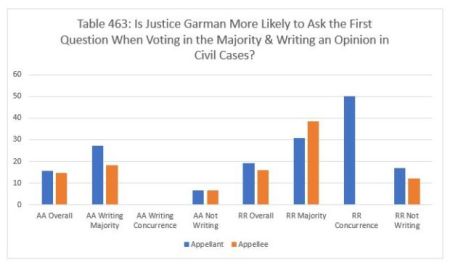Yesterday, we showed that between 2008 and 2016, an unusually high level of questions from Justice Garman indicated that she was likely writing an opinion. We also demonstrated that when Justice Garman was in the minority, she averaged more questions to the party she would vote against rather than the party which would ultimately lose.
Today, we turn to the related question – does writing an opinion make it more likely that the first question will come from Justice Garman?
Overall, when Justice Garman is in the majority of an affirmance, she asks the first question of appellants in 15.69% of cases, and of appellees 14.71% of the time. Writing has an impact; when she's writing the majority opinion, the likelihood that she'll ask the first question to appellant grows to 27.27%. The effect is somewhat less for appellees; Justice Garman asks the first question 18.18% of the time when writing an opinion. When not writing, there is a 6.85% chance she'll ask the first question to appellants, and a 6.85% chance she'll lead off to appellees.
When in the majority of a reversal, Justice Garman begins with appellants 19.32% of the time, and with appellees 15.91% of the time. Writing has a substantial effect; when writing the majority opinion, she asks the first question of appellants 30.77% of the time, and of appellees, 38.46%. When not writing an opinion, where's only a 16.89% chance she'll ask the first question of appellants, and 12.16% of appellees.

When Justice Garman is in the minority of an affirmance, it's far more likely that she'll begin the questioning of appellee than of the appellant – 42.86% for appellees, 28.57% for appellants. When she's writing a dissent, there's a 50% chance she'll begin for both sides. The numbers are different when Justice Garman is in the minority of a reversal (a small data set). Overall, she asks the first question 16.67% of the time for both sides. When she's writing a dissent, she asks the first questions one-third of the time for each side.

Join us back here next Tuesday as we look at the data for Justice Garman and criminal cases between 2008 and 2016.
The content of this article is intended to provide a general guide to the subject matter. Specialist advice should be sought about your specific circumstances.


